Regular readers know that I’m pretty proud to have High Mowing Organic Seeds as a sponsor. Now, I’m more proud than ever.
High Mowing has always been 100% organic, and soon will be the first and only seed house to be certified non-GMO by the Non-GMO Project. They are defining what it is to be an ethical seedhouse in their transparency as well as agricultural and business practices. I had the opportunity to talk to Tom Stearns, the founder of High Mowing Organic Seeds, several weeks ago about Non-GMO certification, the future of GMO labeling, and how seeds can save the world.
This interview covered a lot of ground. I learned a ton and I think you will as well.
Oh, and about that Giveaway? In celebration of becoming non-GMO verified, High Mowing is giving away a $25 Gift Certificate. Details below.
Meet Tom Stearns, The Organic Seed Guy
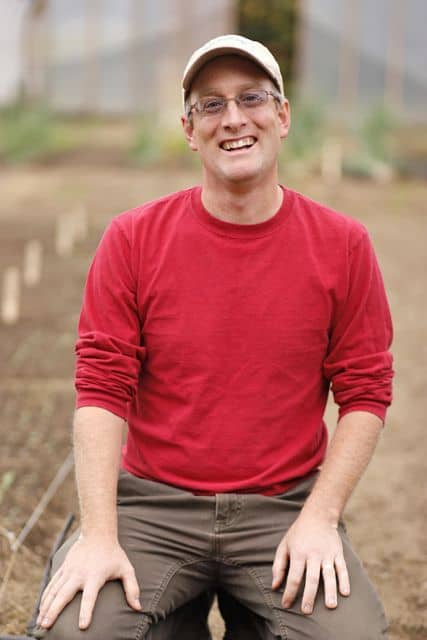
Erica: Hi Tom, thank you for taking the time. Okay, High Mowing Organic Seeds is the first seed company to be certified GMO-free. Can you tell me what’s happened?
Tom Stearns: Sure. Basically, over the last five years as more and more folks have been concerned about GMOs in our food supply, there’s been an effort by the Non-GMO Project to come up with the list of rules that anybody can use to keep GMOs out of their various food products.
This certification is for food companies and farmers and that kind of thing. It’s similar to certification for the word organic. Many people used the term “organic” but then there came the need for a more formal list of rules so that it meant the same thing to everybody that was using it. And when people became certified organic, consumers needed to know that that actually meant something. Of course, many farms have standards that are higher than what certified organic requires of them, so that’s just left up for everybody to figure out how they communicate about that.
So similarly with the Non-GMO Project, companies and products have been able to go through this verification process to let consumers know that they have committed to products without GMO contamination.
And for us, it’s seeds. And that’s new – nobody before us has had their planting seeds verified as Non-GMO. We’ve been working with the Non-GMO Project over the last five years and we’re the first seed company to go through their rigorous process.
Now, for us it was…I’m not going to say it wasn’t a challenge, but our standards internally are already higher than what the Non-GMO Project standards require. So for us it was going through a lot of formality of process and paper work and figuring out the nuts and bolts of how to do it.
Non-GMO Project Verification Process
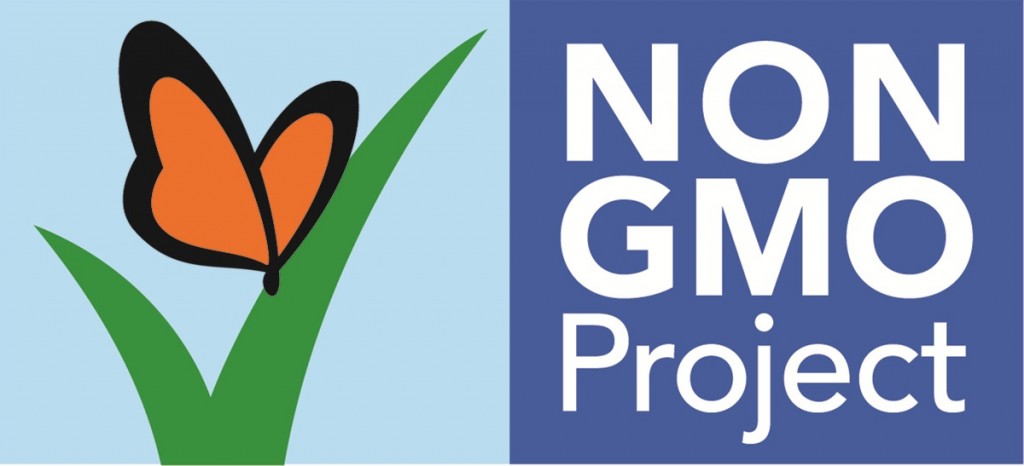
Erica: How rigorous is the Non-GMO Project Certification? Is it the standard for non-GMO certification?
Tom Stearns: Yeah it’s the standard, there may be a few other organizations out there, but The Non-GMO Project is really the big one. I would say that their standard is very high. And our internal standard is even higher.
Erica: Since High Mowing is already 100% certified organic, why go for the Non-GMO Verification above and beyond that? How much of your motivation to get this additional certification as a company comes from maybe a lack of consumer awareness of what these terms really mean?
Tom Stearns: People should know that organic seeds does mean non-GMO. GMOs are not allowed in certified organic. So our seed has always been GMO-free. But we just felt the increasing need, especially in communicating to consumers out there, to go through this like extra layer of certification and verification, so that they knew it wasn’t just us saying GMO free, but that there was a third party audit that was also saying that.
I think some consumers are more aware than others, and we’ve just seen that in the response to a lot of questions like when we’ve posted this on Facebook, we have people saying things like, “I thought that because your seeds are organic they were already non-GMO.” And then another person on Facebook replies to that saying, “Yes, they are.”
So, it’s interesting to see the dialogue between different consumers out there and their knowledge. I would say that for us, almost everything that we do, we look at as an opportunity for education, and for more conversation around seed issues, organic issues, genetics issues. So, for us, it’s about that educational opportunity.
Erica: What educational outreach is High Mowing doing, specifically about non-GMO and organic certification of your seeds?
Tom Stearns: Our entire marketing approach is an educational-based one, basically. We are trying to help people learn how to grow more food for themselves and their communities and seeds are a key ingredient on that.
On this topic specifically I’ve been teaching workshops about non-GMO for years and a we started a new series of workshops over the last two years. On our website right now there’s a more in-depth announcement about this non-GMO verification and it just goes into the background and what we are doing, why we are doing it, how it works, and a little bit about some other pertinent aspects of it.
So we are looking to our partners like you to help spread the word about this, primarily because we feel like the consumer isn’t exposed to seed issues nearly enough and people have a lot of wrong assumptions about things.
Beyond “OMG GMO!” – What You Should Know
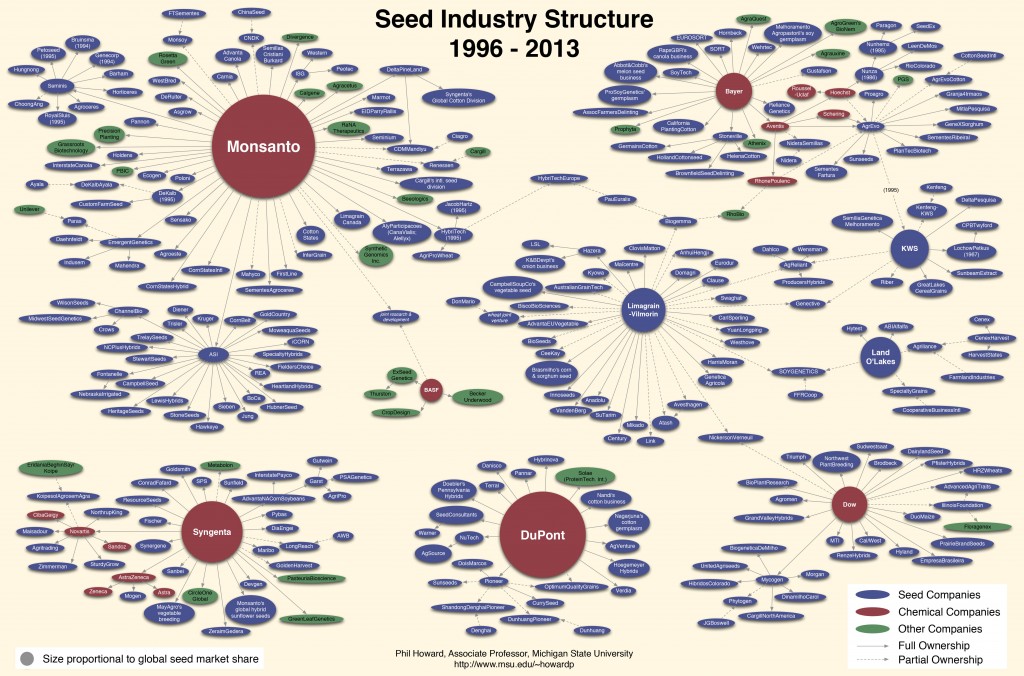
Erica: Other than the issues surrounding genetic modification, what do you feel are some of the seed issues that the consumer should be more aware of?
Tom Stearns: Well there’s a lot of aspects. GMO you could say is a meta-category but underneath that there’re different practices people don’t know much about. CMS is an example. That’s Cytoplasmic Male Sterility and that’s something that some people think of as GMO and some people think of as not GMO, but it’s currently allowed in organics.
High Mowing has just recently come out – and I think we are the first company to have done this – to say that we are firmly in the camp that CMS constitutes genetic engineering and that we’ve never sold any seeds modified like that and we never will, nor will we partner with folks who are working with those kinds of seeds.
But CMS is a rather complex issue in the seed world for hybrid broccoli and cauliflower, and very few consumers know about it. Other companies may have also made some related statements like this about CMS seed, but since we actually sell hybrid broccolis and cauliflowers, it really affects what we do and what breeding programs we work with as seed suppliers. We’ve been inspired as we’ve brought this issue up with several of our major breeding partners, that they agree and also do not use artificial CMS in their breeding programs.
Erica: Can you explain what Cytoplasmic Male Sterility is, and help my readers understand why it happens?
Tom Stearns: Sure. Part of the challenge in making hybrids, with brassicas for example, is that each flower has male and female parts in them so you’ve got pollen everywhere. It’s harder to control the cross in that situation. What Cytoplasmic Male Sterility does is it kills the male parts of the plant on the female line so that you can make the cross really efficiently.
Now, CMS is naturally occurring – it does happen in nature – but it is also artificially induced through cell fusion. That artificial CMS is, I think, borderline at best when we look at what people really think of as genetic engineering. But the National Organic Program says that artificial CMS is allowed when used within the same plant family. For example, naturally occurring CMS in radishes can be transferred through cell fusion into cauliflower and since they are both in the brassica family, the NOP allows that in Certified Organic agriculture. We and many other international organic certifiers believe that artificial CMS through cell fusion is not consistent with organic agriculture.
Erica: What other issues would you like to see more awareness of?
Tom Stearns: Another big issue has to do with the seed industry consolidation: who owns seeds and who owns seed companies. People worry about us getting bought out by somebody, or think are we just owned by some other company that’s really pulling the strings. I think people really have a lot of fear of Monsanto and the concern of Monsanto buying up every little seed company. We will always be independent.
So it’s a huge issue for us to help people understand where their seeds come from, who is growing the seeds, where they adapted to grow well and where they will thrive. And again a lot of this goes back to our approach of trying to have full transparency with our customers about what we do and why we do it.
GMO Contamination and The “Pound of Prevention” Philosophy
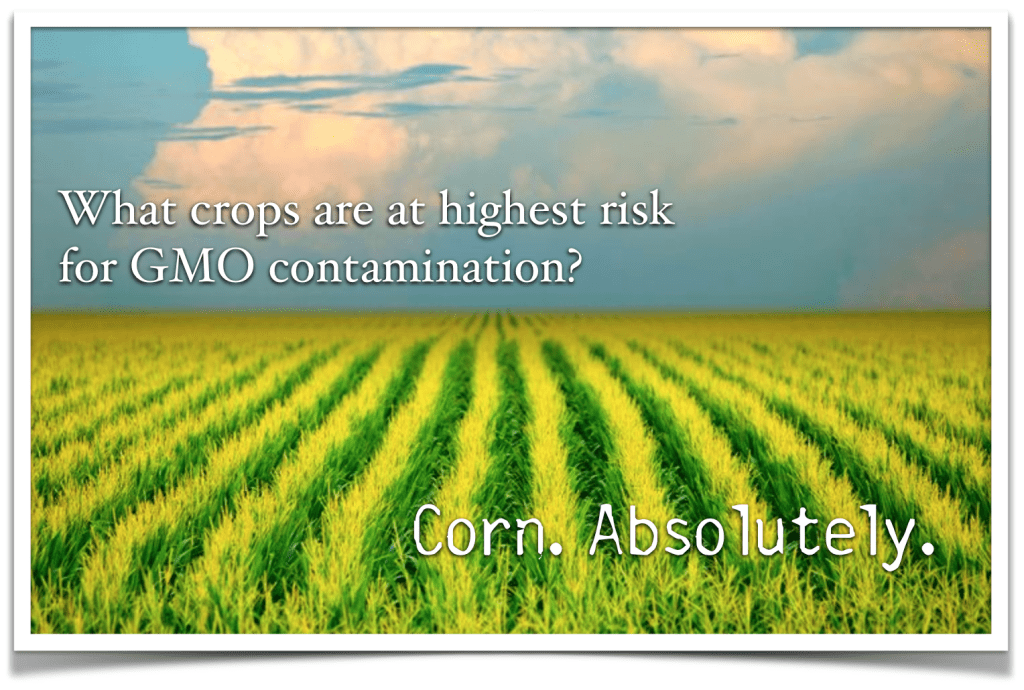
Erica: As an already 100% organic company what changes or challenges did you encounter getting your non-GMO certification?
Tom Stearns: What I found is that for us there is a combination of two things that are part of our success in making sure our seeds are always free of GMO.
One is prevention, so obviously the first thing you want to do is prevent GMO contamination. We already had pretty robust measures in place for that, but going through the Non-GMO Project Certification process helped us to get better, which we always want to do.
So prevention means several different things. We start by testing our stock seed, which is the seed that we plant to eventually get more seed. So, for example, let’s say that you planting seed in a perfect place, on an organic farm, and it’s isolated, and you take good care on how you’re handling it so you’re not getting it mixed up with anything along the process of harvest or whatever. But if that seed stock starts out contaminated, when you come to the harvest and you do a test, you’ll see that your harvested seed is contaminated.
But if you don’t know that your seed stock was contaminated you’re going to start looking for all sorts of other things like, “Oh, did it cross with the neighbor’s field we didn’t know about? Was there some problem along the way?” So, starting with testing of the stock seed is critical.
Then, these other aspects of prevention like isolation and a really tight mapping system to keep track of where all our seed crops are being produced is key, so that’s been tightened up a good bit. We know what we are growing, and what all the neighboring fields around our fields are also producing to ensure proper isolation.
And then finally, the testing protocols. Before Non-GMO Project Certification, we did a lot of testing in-house, but in order to meet standards for non-GMO certification we’ve increased to the amount of testing that we are doing. That’s meant figuring out more efficient ways of doing that testing, while being statistically accurate.
Erica: I think that that’s a great point. Ensuring the seed remains GMO free is an expensive and logistically complex endeavor. It’s not just sticking a label on a seed packet and crossing your fingers.
Tom Stearns: Right.
Erica: Based on the additional work that you guys have had to go through to get this Non-GMO Product certification, do you think that the consumer has a right to be worried about cross-contamination, even with certified organic seed?
Tom Stearns: It’s a great question, I think that that confidence is between the consumer and the company they’re buying seeds from. They may be very confident in it. And the closer the relationship is, the more confidence they probably could have.
A seed company is often pretty far removed from you, though. You’re ordering seeds online, or through the mail. And what’s actually more concerning I think to a lot of people, is that most seed companies don’t actually even grow any of their seed. So the seed companies themselves are quite removed from the seed production, which is where the contamination usually happens.
Many folks, many seed companies, have good practices about preventing GMO contamination, but we felt like enrolling in this program and becoming verified really made us better. Not compared to other people, just compared to what we had already been doing.
Erica: Did you run into any surprises with your testing? Did you have any contamination you hadn’t been aware of?
Tom Stearns: No, and that’s great news. Because if we had a test of one of our seed crops that was positive for GMOs, I would consider it a failure of our system. Even once. It’s kind of like a food safety issue. You go through your whole process as a food manufacturer to make sure that you don’t put somebody at risk with e-coli, and if they do, you know, it’s pretty awful news.
And this case is nothing quite as dramatic as that, but 95% of our investment is in prevention. Testing is just to check whether that investment is being used right.
Erica: That’s wonderful. Based on the crops that are currently being grown out as genetically modified, what are the crops at highest risk for contamination?
Tom Stearns: Corn, absolutely, and for several reasons. People grow corn everywhere, as opposed some other crops that are much more isolated. Also, 90% of the corn grown in this country is genetically modified already. So that means the likelihood of your seed corn being grown near a GMO corn field is pretty high, no matter where you are. And finally, corn is wind pollinated so that means that it doesn’t behave and stay within its field very well.
Erica: Sure. That makes sense. And in general with the big GMO commodity crops – corn, soy, sugar beet, canola – the contamination risk is in those and related crops. But do you feel like the future is genetically modified versions of many of the market crops, too. I mean, not just the commodity staples but the lettuce, the carrots?
Tom Stearns: Well obviously I hope lettuce and carrots do not become genetically modified, but I think that there are some crops where there’s a lot of money and a lot of acreage, and those will likely be the next ones in line for genetic modification.
With this certification, we are labeling everything and verifying everything that we sell as non-GMO. There are some crops that don’t yet have genetically modified versions yet, but what this project and the Non-GMO Project certification process has enabled us to do, is to prepare in advance.
Take lettuce for example, if lettuce was genetically modified, we would need to implement a whole system-wide process to make sure that the seeds weren’t contaminated, and to determine selection, and where to produce it, and how to test it. And it’s not just the testing; it’s also interpersonal things, like building strategic alliances with all sorts of different companies, businesses, farmers all over the world and really taking those relationships seriously.
But because lettuce isn’t genetically modified, most seeds companies haven’t gone through any kind of process like that. But now with this project and with us being verified, we’re working on that with all of our crops.
So what this does is, instead of putting us in the position of scrambling when GMO lettuce happens, we are working to put our controls in place. This includes our mapping system locating all of our productions wherever they are in the world as well as just on our own farm here. We are developing stronger policies to make sure that we know what every single neighboring field within miles is doing; and continuing to develop the stock seed testing protocols.
Now obviously we’re not testing our lettuce for GMO contamination because there is no GMO lettuce yet, but our systems are getting in place. And all you need to do is to look at the example of wheat out your way that happened a couple of months ago to know that even though there is not GMO wheat commercially on the market, that experimental GMO wheat from test plots escaped and then it’s out there, in farmers fields.
So we may need to act very quickly in a case like that, as opposed to having a couple of years heads-up like we did with GMO sugar beets.
Erica: Out here in the Pacific Northwest as you know, exports of agricultural products are a huge part of our economy. That’s something that most people who think about Seattle as Boeing and Starbucks don’t even know. So many of our international agricultural markets just shut down at the mention of possible contamination of wheat or any of the other staples. It’s terrifying. I don’t think people fully understand the financial implication of this kind of contamination. It’s not just a hippy issue, it’s a business issue.
Tom Stearns: Yeah, no doubt. And I think many conventional growers are not going to be interested in the risks of GMOs, not necessarily because of some philosophical reasons, which is behind a lot of organic farmers distaste of it, but because of these economic issues and complexity issues like, “don’t put my crop at risk.”
Erica: Absolutely.
Tom Stearns: And Russia just said no to GMOs, China banned it for their army, the Chinese army. These are massive players around the world that are saying, “we don’t need any of your American made GMO seed”. So whatever the motivation behind rejecting GMO crops, the world and the tides are really shifting.
True Progress, Labeling, and The Future of GMOs
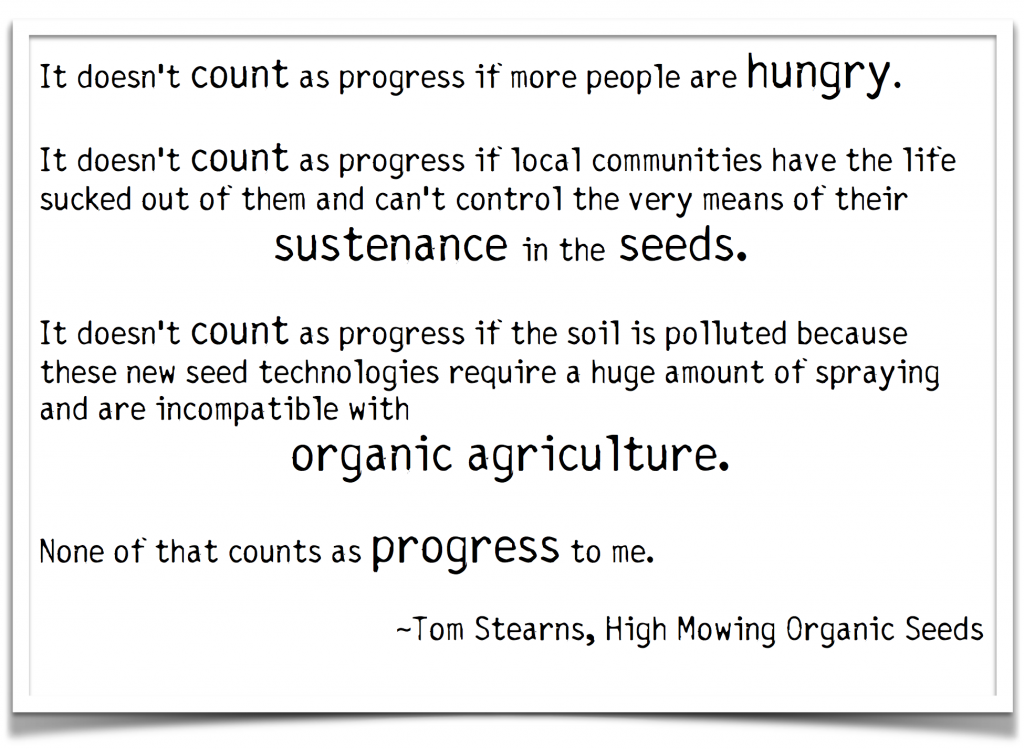
Erica: I agree that there’s greater awareness about these issues, but given that agribusiness companies, companies like Monsanto, say things like, “we need this technology to feed the world,” what’s your response to that? How do you as a conscientious seedman respond to that kind of thing?
Tom Stearns: Well I think that some advances in technology in agriculture have not led to a decrease in poverty or hunger. All of our advances in the last 50 or 100 years have still left many people hungry. So it’s not a silver bullet, it’s not just a technology than can solve things. There is a whole social structure and equity of wealth and a sort of democratization of the global food supply that needs to happen. That’s what all those scientists and smart people at Monsanto should be focusing on.
Erica: So you’re saying it’s more of a distribution issue.
Tom Stearns: It’s a distribution and a social issue a lot more than it is specifically an agricultural issue. I am a huge believer in agricultural progress big time, but it doesn’t count as progress if more people are hungry. It doesn’t count as progress if local communities have the life sucked out of them and don’t have the ability to control the very means of their sustenance in the seeds. It doesn’t count as progress if soil is getting polluted all over the place because these new seed technologies require a huge amount of spraying and are incompatible with organic agriculture. None of that counts as progress to me. So I’m not a luddite but true progress looks a lot different.
Erica: What does true progress look like?
Tom Stearns: I think it is balancing the ecological realities that we live in on this planet and taking a long term view to designing a food system that is in line with those things.
Erica: You guys are located in Vermont, the first state to pass GMO labeling law. Was High Mowing a participant in that effort?
Tom Stearns: We were there when it happened, absolutely. Yeah, we’ve testified and written many letters over the years in this process here, and you know, it’s obviously a multiyear process and we were pretty proud that day. When they announced the legislation, we were down there in the state house at Montpellier and we passed out about 2,000 seed packets to everybody that was there.
Erica: I think the fact that Vermont has passed this legislation is fantastic, but given the huge industry opposition and money that gets thrown against state initiatives to label GMOs, do you think that the future of GMO awareness is going to be in private certification programs like the Non-GMO Project? Or do you think that Americans can expect eventually, some sort of legislative assurance?
Tom Stearns: What a great question. I think that, you know, what the Non-GMO Project has said is, we’re going to label it, to make sure people know when it’s not GMO. What the state efforts are saying is, we think that the label should say when it is GMO, and then everything else you can assume isn’t. And organic, there’s already a label for that.
So, I am not sure how it’s all going to shake out. I do suspect that there will be nationwide labeling within five years, by the feds.
Erica: That would be amazing.
Tom Stearns: And I wouldn’t be surprised if it’s even sooner.
Erica: In five years?
Tom Stearns: Yeah.
Erica: I am flying out to Vermont and I am buying you dinner if that happens.
Tom Stearns: Well, all of these state by state efforts are just going to be a huge pain for everybody. And the more of a pain they are, the more ammunition that is for the feds to pass a single labeling law. And the more the food companies that are fighting it are going to want that to happen too.
Erica: I sure hope you’re right.
Tom Stearns: This is nothing new, I mean food companies have to deal with different state labeling laws all over the place, and what they do is, they just label to the highest standard, so they don’t have to have different packaging for every state.
Erica: Speaking of costs of labeling, should your customers expect a price increase in your seeds because of the additional certification?
Tom Stearns: No, no price increases, because we were doing this stuff already. So we already had so much of this in place that we don’t need to pass any of these additional costs on to anybody.
Erica: Sounds like a win, win, win.
Tom Stearns: Yeah, you know, in a few years, if the FDA starts dictating rules on what people can claim about GMO-free or non-GMO the way they did about organics in 2002, it’ll be interesting to see what happens.
Because the terminology surrounding GMO isn’t regulated, many seed companies can say they’re GMO free, but they are not testing anything. I’m curious about what may happen if GMO-free claims become something you can’t just use without third-party verification. I think eventually non-GMO claims will require some kind of verification or certification. So, for us we just wanted to put that in place now.
Erica: Do you feel like, with this Non-GMO Project Verification, you’ve kind of gotten as good as you can be? Or is there some way you can you improve transparency or get better as a seed company?
Tom Stearns: Oh we’re insatiable! Being insatiable means that you always have somewhere further to go.
Erica: Do you have a target for that? Is there something else on the horizon for High Mowing that you can talk about?
Tom Stearns: That’s a great question. Let’s talk about that another time, but I would say that High Mowing has a lot of ambitions to help supply the seeds that we need to rebuild our entire food system.
Erica: Rebuilding the entire food system is pretty insatiable.
Tom Stearns: Well, I’m just talking about planet Earth. So we’re holding it to that for now.
Erica: I’m kind of disappointed that you aren’t talking about terraforming Mars.
Tom Stearns: Not yet. But these little things, seeds, are absolutely the most powerful vehicle for the kind of positive change that we need to see. And we feel that really deeply.
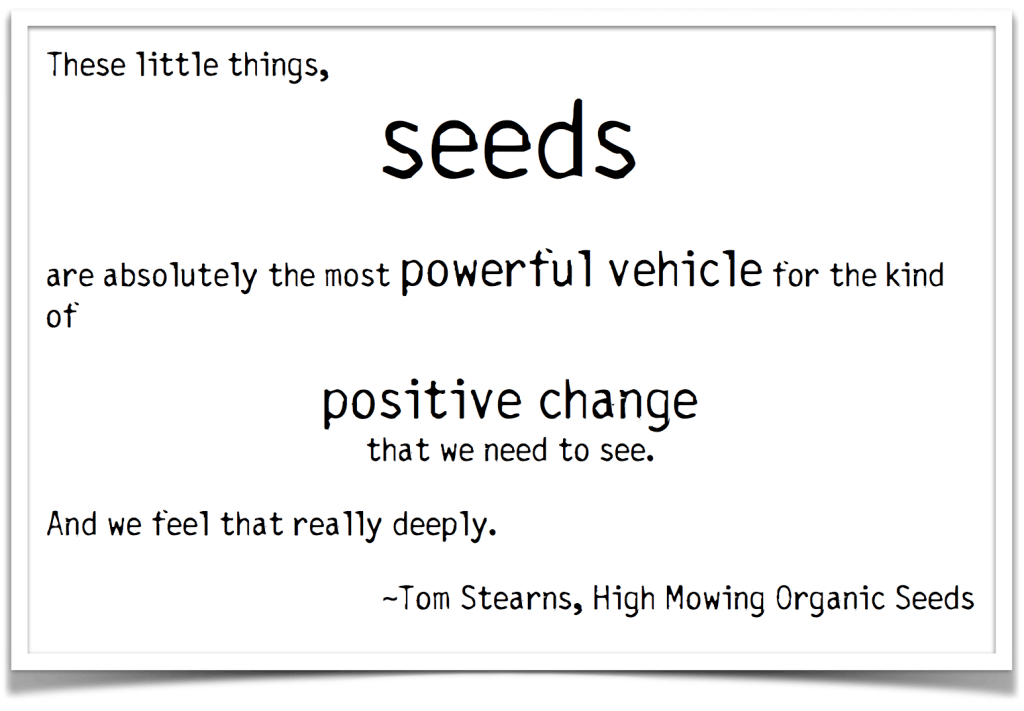
The Giveaway!
High Mowing is very committed to encouraging a dialog about seed issues like these. They are giving away a $25 gift certificate good for any of their seeds. You pick! $25 will buy a nice selection of their organic, non-GMO seeds.
To enter, all you have to do is leave a comment below telling me if and why non-GMO seeds and food are important to you. Alternatively, if you have any questions about genetically modified seeds, ask away. Your questions may help inspire or direct future posts.
If you think organic agriculture and growing your own food is pretty awesome, I also highly recommend signing up for High Mowing’s information-packed monthly newsletter, The Seed Bin.
Fine Print: Contest open until Tuesday, July 15, 2014, 8 pm PST. Winner will be notified by email and shall have 48 hours to respond to claim his or her prize. Contest open to residents of the US and Canada. The prize is a $25 gift certificate, furnished by High Mowing Organic Seeds. Good luck!
0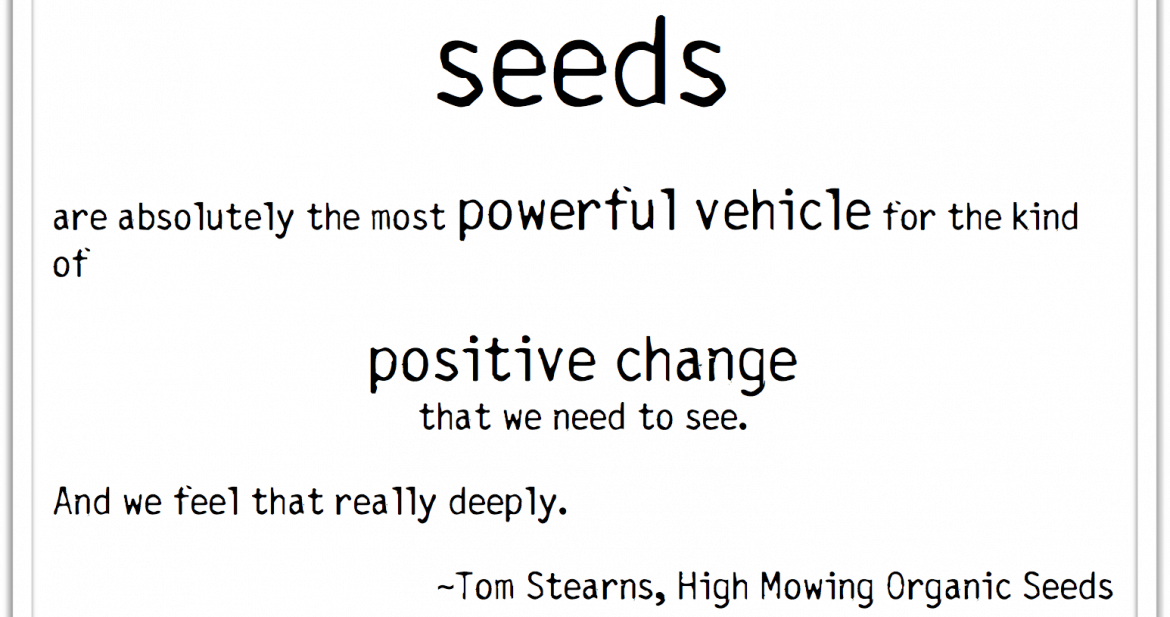
Get labeling of GMO foods done and the rest will follow.
I don’t think of myself as a non-GMO psycho, but if I see something like flour, that’s milled here in the Pac NW and is labelled with the Non-GMO Project label at Fred Meyer, you bet I’ll pick that up – even if it’s more expensive than generic. Supporting my local/regional economy, and sending the message to the big-chain grocery stores that this matters to people is one of the ways I spend my food dollars. Not perfect in this by any stretch of the imagination, but I’m getting there! I also am suspicious of the correlation (which is not necessarily *causation*, I know) between the rise in GMO foods and the rise in food allergies. While not affected personally, several family members are allergic to corn, soy, and wheat. 🙁
I also enjoy gardening and grow a lot of our salad vegetables (lettuce, kale) and some other veggies and flowers (peas, beets, carrots, beans – if the rabbits stop eating them)!
I don’t particularly care about GMO or non-GMO. Humanity’s ability to mess with nature is awesome and can be used for good.
That said, I do care about taste and nutrition, and conventionally grown crops lack that. After seeing Tom praised in The Resilient Gardener, I’m probably going to give High Mowing a good chunk of my seed budget for 2015.
My childhood friend has a form of Lupus that makes her sensitive to GMO food. She actively campaigns for GMO labeling on all food. Now that I have two kids I find myself keenly aware of food labels.. Looking for nitrate free/organic/non-GMO. I can’t imagine not giving my children the best food I can find.
GMO-free seeds and food are important to me because I feel that it is our right to know what is in our food and to be able to choose healthier ways of growing crops, rather than being forced into what big companies force on us to serve their interests.
We all need to hit them where it counts right in the pocket book once they see profits shifting to non GMO & organic they will give up on this blight on society !
We have a big non GMO labeling movement here in Oregon that is gaining traction but failing to make progress in the non gardening, general population due to a lack of common sense explanations like Tom Sterns being publicized and promoted.
Non-GMO seeds are important to me for two reasons:
1. I don’t want to worry about the potential health effects of GMO crops.
2. I don’t like the idea of large corporations using Intellectual Property (IP) laws to restrict seed saving.
I am a total believer in Non-GMO seed and food. I thing GMO’s have not been tested well enough to prove that they are safe. In addition, I am very concerned that the cross contamination of hybrid and non-GMO seed is happening and is a dangerous trend. I applaud those companies, like High Mowing, that are dedicated to non-GMO & Organic seed 🙂 !
Non-GMO seeds are important to me because I want the purest, most natural food for my family. I also fear the monopoly big chemical companies, via their patents, seem to pursue with regard to our food supply.
GMO’s are the scourge of decent people everywhere. We MUST do all we can to end this cycle and return to some sort of normalcy, at least in what we put in our bodies. We ( fellow non-GMO’ers )must keep trying. GOD BLESS US ALL ! Dick Valenzuela
All the ways we tinker with nature have unforeseen results, and our food systems are already so artificial. I choose organic whenever I can, give this world as much of a boost as we can.
Non-GMO food and seeds are super important to me! Two of the biggest reasons for me: I don’t like the idea of major corporations having absolute control over the food and seed supply; and I think that having pesticides bred into plants is a super bad idea, both for health reasons and for the purpose of preservation of biodiversity.
I have two grandchildren that seem to have every problem that stems from poor nutritional value…asthma, over weight, developmental delays…, and their mom has a problem of not enough Tom Stearns to offer non GMO projects, so lets all help by getting his seeds out in our preschools so they can grow some lunches, and let our stores know that if we don’t know what it is, we will not buy it! Debra